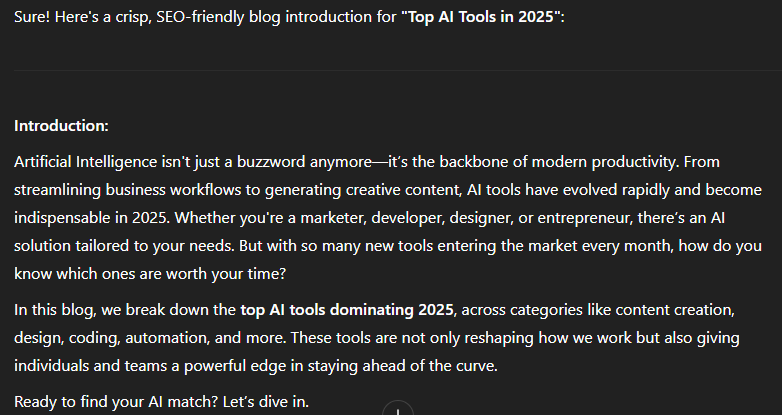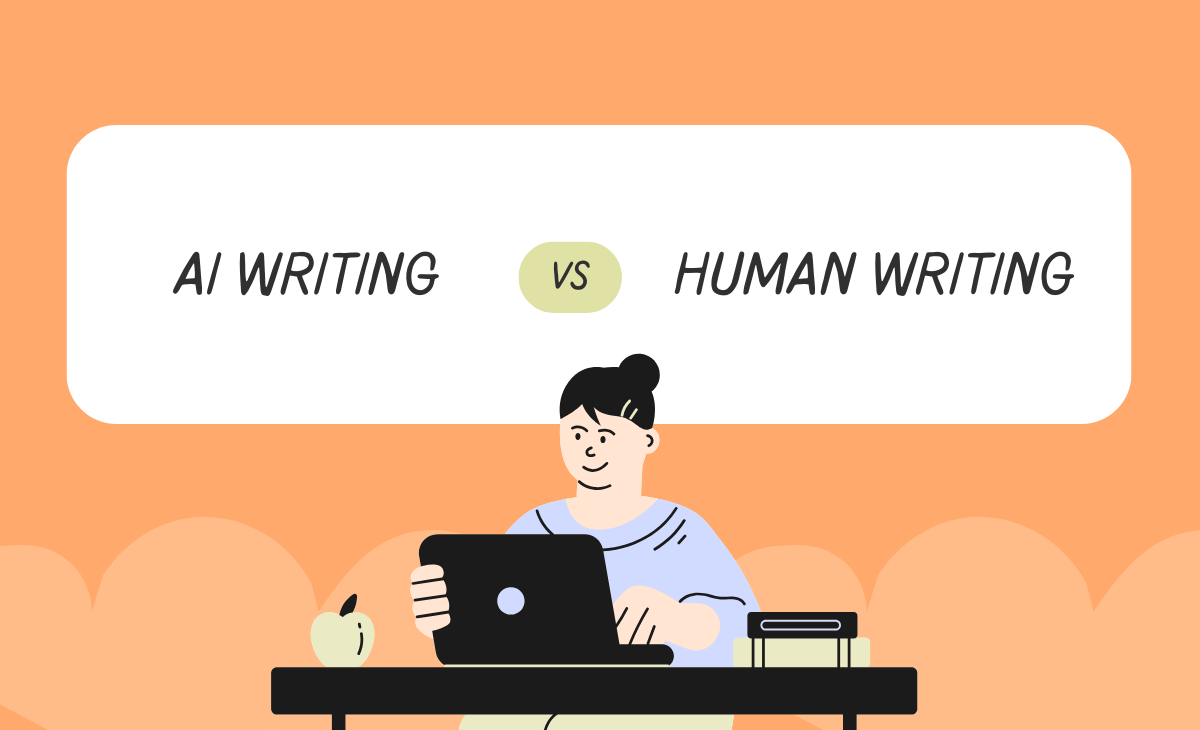To know the key difference between AI Writing vs. Human Writing, you have to think like an AI detector. An AI detection follows a standard procedure for determining if a written piece of content is not by a human.
What happens is that the popular detectors in the market check for the common signals in a given text and help you refine your work to avoid penalties. These common signals or the key giveaways of AI-detected writing include a robotic tone, a lack of new insights, and so on.
Now, if you are a marketer, student, or writer in general, you know that not everyone’s a big fan of AI-generated content. Be it Google’s preference for more personalized content or the lack of comfort in AI-generated writing, it just doesn’t sit right.
However, it's comforting to use AI, knowing that it will always have our backs with its god-level speed and impeccable English. This is why there is always a conflict of choice between AI-generated writing and a human writer. But if we had to pick a winner, which one should it be? Read along to find out.
What Is AI Writing, and How Does It Work?
AI Writing is the simple concept of using AI to write something. The reason it has gained popularity is that it is fast and is rarely known to commit grammatical errors. Usually, AI-generated content is driven by a prompt where you tell the AI what it needs to write about.
Now, a setup like this sounds easy and fun, as you might think if you are in charge of the narrative. But, sadly, it isn’t so. When you write with AI, all you do is tell AI what to do, and the rest is up to the datasets it is trained on.
Here’s a quick example: imagine that you wish to write a blog on the top AI tools in the market. All you have to do is go to ChatGPT and give it a prompt, and that’s it. This is how it will look:

The moment I asked ChatGPT to write an introduction, it gave me the above sample in seconds with perfect English and optimized sentences. I had kept the prompt as generic as possible to see what it’s capable of.
Even though everything seems fine with this prompt at first glance, here’s everything that could have been avoided:
➡️ Same old repetitive phrasing like any other blogs with words like “buzzwords”, “indispensable”.
➡️ The blog reads more like a sales pitch and is minutes away from forcing you to buy one of the products.
➡️ There is no scope to form a connection with the readers as there is no pain point that’s highlighted. If I were reading this blog on a reputable website, the first thing that would have bothered me is Why do I need to go through this list anyway?
In short, AI-generated writing is fast, accurate, and concise, but it lacks awareness of its audience. AI doesn't understand user intent or who it is writing for. All it understands are keywords from the prompts.
💡Quick Note: It’s not just about this one robotic blog sample. It s not suprising to know that a study published by HubSpot shows that 60% of marketers are concerned that generative AI could disrupt their brand’s voice.
What is Human Writing?
Human writing is everything that you know about writing before AI started dominating the space. It is what I, you, or anyone human writes a piece. Human-generated content from a marketing standpoint is when a brand or a website relies on human creativity to write about its products.
As in, there is a real person involved in the narrative that tells you why you should buy the product. So, this is how human creativity can make a difference in your content generation setup.
This is how I would have rewritten the blog sample generated by ChatGPT:
“No one likes to struggle with pending deadlines, hefty research, or create SEO optimized blogs for their content. We need instant solutions that not only give us an upper hand over the competition but also help us stay efficient. Thankfully, to solve this problem, we now have an AI tool for almost every online need.
But here’s the catch: with new apps and platforms launching every other week, it’s hard to tell what’s genuinely helpful and what’s just hype… continue”
This took me a whole good two minutes to write, if I had to calculate it from ChatGPT's standard, I am already two articles behind. But here’s why my write-up will be more effective in the long run:
➡️I built an instant connection with the users by highlighting the anxieties of the present workflow.
➡️There’s also a highlight of the apparent confusion in regards to the various AI tools in the market.
➡️ A user will be intrigued to read further to know what tools I am suggesting, as I have already gained their trust at this point. As I tick these important boxes, it will take care of the higher bounce rates and help with SEO and organic traffic too.
AI Writing vs. Human Writing: Head-to-Head Comparison
AI-generated writing and Human writing can be vastly different, even though they write for the same product or brand. One writes for the keyword and prompt, whereas humans write for user intent, offering viable solutions to build a connection, and so on. Here’s a quick breakdown of the same:
- Language style and tone: AI is usually formal or uses a generic tone to address the readers. Even though you will never find a grammatical error in AI-generated writing, it can sometimes be painfully boring.
Whereas, humanized writing is versatile and changes as per the mood of the writing sample. You can rely on human creativity to adapt to a lot of things, and it can be formal, conversational, sentimental, playful, and so much more, depending on your needs.
- SEO performance: AI is great at placing keywords in your write-up, and well, that’s about it. If you wish to see SEO oriented results, you have to rely on humanized content. As humans, we know how to focus on intent and relevance. Moreover, the search engines also have a preference for personalized content.
Quick Reminder: Speaking of Google, it declared in its last update that it will start flagging content that is not original. There won't be any penalty as such, but you will see 45% less low quality unoriginal content. So, take this as your cue, without humanized content, ranking on Google is going to be a challenge.
- Creativity and originality: As you have also seen earlier, AI-generated content is clean, but at the same time, it is dry. It feels like a sales pitch that you have read multiple times before and has a pattern and rigidity. Whereas a human writer crafts a new piece with every outline that has never been read before.
- Factual accuracy: AI is solely reliant on the datasets it is trained on. So, there is always a possibility that you might be relying on backdated data to base your facts on. This can lead to legal repercussions and a mistrust amongst your potential users. Also, not caring about factual accuracy is one of the major things that brands get wrong about AI content regularly.
- Emotional resonance: As a human, when you write about an AI writing tool, you will reflect the labor of research, the anxiety of creative blocks, and so much more. But AI doesnt know these emotions; all it can do is to mimic them from keywords and just try to present a decent case while selling the product.
- Adaptability to brand voice: Does AI know that a writing tool and a paraphrasing tool are different? Or is there a difference between a paper writer and a blog writer? Well, it doesn't, and that’s why AI always seems to miss its mark whenever the fine lines between the products seem to blur. It tends to repeat the narrative or miss the point altogether.
| Trait | AI writing | Human Writing |
| Language Style & Tone | Repetitive | Versatile |
| SEO Performance | Basic | Advanced Measures |
| Creativity & Originality | Basic | Intentional and Advanced |
| Factual Accuracy | Risky | Reliable |
| Emotional Resonance | Imitated | Authentic |
| Brand Voice Adaptability | No | Yes |
Can AI Replace Human Writers?
When we talk about AI writing vs. human writing, the discussion always leads to one important question: Is AI capable of replacing us? Well, the answer is simple and yet complicated at the same time.
AI is not versatile, doesn’t understand the basic buyer’s intent of buying the product, and it cannot be trusted with the facts either. But it is fast, quick, and always perfect with its grammar. AI can do our day’s work in less than a minute, and that too for free in most cases.
So, the answer to this question would have almost been a yes if AI were smart enough to understand empathy, connection, and had the human creative flair. AI is boring, keeps saying the same thing, and is too rigid to adapt to changes.
So, the ideal answer to this question is having a middle ground where AI brings in the speed and efficiency, and we come in with creativity and emotions. The humanization of AI content is what the future is all about, where we do not have to compromise one for the other.
Final Verdict: Why It’s Not AI vs. Humans, It’s AI with Humans
As we wrap up our observations of this head-to-head battle between AI writing vs. Human writing, one thing is clear: it doesn’t have to be this way. AI brings unmatched speed, efficiency, and grammar precision to the table. But on its own, it is a setup that is not capable enough to keep up with the brand voice.
Whereas human writers bring in creativity, empathy, and contextual understanding, something that AI is completely unaware of.
So, the concept of replacing one with the other is only going to be detrimental to your setup, if not anything else. The idea here is simple: Let AI do the grunt work, and we can take care of the creative aspect.
AI is there to help us with outlines, structures, basic SEO, and, in turn, freeing us to do the more important things like focusing on original thought, voice, emotion, and narrative flow.
The future of content is never about choosing sides. It’s about finding a middle ground that helps us stay up to date with AI’s speed and the human capability of being empathetic, unique, and, most importantly, adaptive to market changes.

